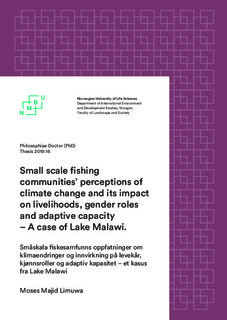Small scale fishing communities’ perceptions of climate change and its impact on livelihoods, gender roles and adaptive capacity : a case of Lake Malawi
Doctoral thesis
Permanent lenke
http://hdl.handle.net/11250/2583975Utgivelsesdato
2019Metadata
Vis full innførselSamlinger
Sammendrag
Fisheries remain a major livelihood for many Malawians despite continued low fish catches negatively impacting households, which depend on this resource. The main objective of this thesis is to reduce the current lack of empirical evidence on added impacts of climate related changes and how fishing communities are coping with such changes. Malawi has been experiencing extreme weather events that affect livelihoods. Therefore, in addressing this major objective, four interlinked research studies were conducted in Nkhotakota, a lakeshore district on the western shores of Lake Malawi, which has been experiencing such extreme weather events. These four studies examined aspects of perceptions to changes in fish catches and climate; gendered fish value chain; alternative livelihood sources; and enhancing adaptive capacity through development initiatives.
To respond to these aims, the interlinked studies were guided by different theories and conceptual frameworks. The main conceptual framework for this thesis is the sustainable livelihood framework. Other additional concepts and theories including gender and development, vulnerability, and sustainable food systems were also used. The research was conducted in phases between August 2015 and August 2017. The research used mixed methods (qualitative and quantitative) in data collection and analysis. This thesis is framed around 671 household interviews, 40 focus group discussions and 25 key informant interviews. Content analysis for related themes was the major qualitative method, while quantitative methods involved both descriptive and inferential statistics. The main findings from the four interlinked studies are presented in the following sections.
In the first paper, perceptions of small scale fishers and their coping strategies for extreme weather events were evaluated. The results revealed increased incidences of extreme weather events. However, the analysis of climate variables such as temperature and precipitation did not reveal significant changes. This study cautions against relying on perceptions despite local knowledge is useful in the absence of conventional scientific knowledge. The study also showed multiple livelihoods diversification strategies in response to perceived low fish catches. However, some of these coping strategies were not sustainable for the fishery.
In the second study, gender analysis was used to evaluate whether perceived changes in climate impacts the fish value chain and livelihoods. The results showed that coping strategies for perceived changes was gendered. Furthermore, more women were involved in post harvesting fisheries activities compared to men, who were catching the fish. The study also revealed an influx of women in fisheries was attributed to high purchasing power of fishing equipment and not on perceived changes in climate. However, women were employing men to catch fish on their behalf. Despite the increased participation of women, they still lacked power to control the proceeds from fisheries related incomes. Furthermore, this study showed changes in livelihood portfolios from agriculture to fisheries.
The third study we evaluated the importance of fish farming as a sustainable livelihood coping strategy. The study showed that the respondents did not consider fish farming as their major livelihood source attributed to small fish earthen ponds. Fish farming was also androcentric despite women being custodians of the farming land. Even though land and water were available to expand fish farming, farmers cited lack of quality inputs and extension services as major challenges. Furthermore, there were conflicts related to water usage with rice farmers and recycling of residues from farm animals and plants to fertilize fishponds, as farmers opted to use the same in agricultural fields.
Finally, in the fourth study, we assessed development initiatives, livelihood assets and adaptive capacity among the fishing communities. Participants for the groups of development initiatives were characterised by low incomes from fisheries and remittances; small land holding sizes and had lived in the study area more than non-participants. Even though the study showed the impact of some initiatives in enhancing adaptive capacity, some selection bias existed. The study also revealed high-income inequalities for both beneficiaries and non-beneficiaries. The paper also showed the potential for development initiatives especially infrastructure in reducing vulnerability and income inequalities even though their focus were not climate change oriented.
The findings from this thesis provide a basis for forming and implementing evidence-based policies in countries whose people rely on climate-sensitive livelihoods. For instance, these findings can be used to inform the Malawi National Fisheries and Aquaculture Policy as well as the participatory fisheries management framework that lacks strategies to deal with climate-related changes and other important socioeconomic factors such as gender. Additionally, other service providers in rural areas can frame their strategies based on the findings of this thesis. Fiske er fortsatt en viktig levevei i Malawi, til tross for at dårlige fangster har en negativ påvirkning på husholdningene, som er avhengige av denne ressursen. Hovedmålet for denne avhandlingen er å redusere dagens mangel på empiriske bevis for virkningene som følger av klimarelaterte endringer, og hvordan fiskerisamfunnene takler disse endringene. Malawi har opplevd ekstremværhendelser som påvirker levekårene. Under arbeidet med dette hovedmålet ble det derfor utført fire innbyrdes relaterte forskningsstudier i Nkhotakota, et distrikt på den vestlige bredden av Malawisjøen, som har opplevd slike ekstremværhendelser. Disse fire studiene undersøkte aspekter ved oppfatningene av endringer i fiskefangst og klima; verdikjeden for fisk med hensyn til kjønn; alternative kilder til levebrød; og å styrke kapasiteten for tilpasning til klimaendringer gjennom utviklingstiltak.

